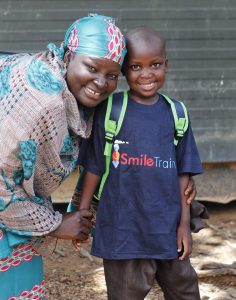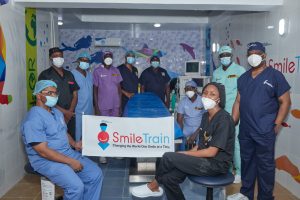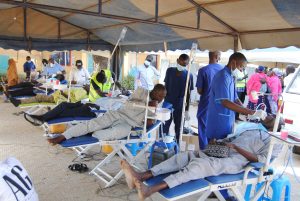By Prosper Ishaya
In 2016, a few weeks after Najashi Usman’s birth, his mother, Asiya Usman noticed an unusual formation on his lips. Alarmed, she took the infant Najashi to a nearby clinic, where he was diagnosed with a cleft lip. The doctors recommended immediate surgery. She felt helpless because she couldn’t afford the surgery (which cost about N40,000 at the time), so she kept Najashi hidden from the public for months, fearing stigma and judgment.
But months later, Mrs Usman became aware of a radio announcement about the Grassroots Smile Initiative (GSI), which provided complimentary cleft lip surgeries and associated care. Needing assistance, she recorded the details with a neighbour and proceeded to the Armed Forces Specialist Hospital in Kano, where the program was located.

“At the hospital, doctors attended to us, leading to a series of appointments until Najashi’s cleft surgery at five months and palate surgery at eight months,” Mrs Usman told Social Voices.
A cleft lip is a birth defect where a baby’s upper lip doesn’t form properly during early pregnancy, leaving an opening or split. It can range from a small notch to a large gap that extends up into the nose. It often occurs alongside the cleft palate, which is a similar opening in the roof of the mouth.
According to Imeh Umoren, Consultant Pediatrician at General Hospital, Calabar, early treatment is crucial for a child’s health and development.
“Cleft lip and palate result from tissues failing to fuse properly during pregnancy,” Umoren explains. “While genetics play a role, factors like poor maternal nutrition or infections can increase the risk.”
Sometimes, it’s written in the baby’s genes, passed down through family history. Other times, external factors, such as a mother’s diet lacking essential nutrients such as folic acid, exposure to harmful substances like tobacco or alcohol, or certain medications, may play a role. In some cases, an expectant mother battling diabetes or an infection might unknowingly face a higher risk.
A comprehensive study conducted between 2006 and 2011 across seven Smile Train treatment centres in Nigeria identified 2,197 cases of orofacial clefts out of an estimated 4.6 million live births, resulting in a prevalence rate of approximately 0.5 per 1,000 live births. Another study spanning from 2009 to 2020 reported 280 cases of cleft lip and/or palate among 232,168 live births, demonstrating a higher prevalence rate of 0.8 per 1,000 live births.
The data indicates a persistent prevalence of cleft conditions in Nigeria, while access to quality care remains limited for many affected individuals. However, relief is provided through the Grassroots Smile Initiative (GSI), a nonprofit organisation based in Kano State that offers free, comprehensive care for individuals born with cleft conditions.
GSI addresses both the medical and social challenges associated with cleft lip and palate through a holistic approach that goes beyond surgical procedures. “Comprehensive health care means that after the surgery, we also provide nutritional support, speech therapy, orthodontic treatments, Ear, Nose, and Throat services, and, most recently, empowerment for the mothers and guardians,” shared Oreofe-Oluwa Adebola, program manager at GSI, in an interview with Social Voices.

GSI delivers cleft care services in partnership with the Armed Forces Specialist Hospital in Kano. While the hospital provides the facility, GSI maintains its own surgical team responsible for performing cleft surgeries. Some hospital staff also receive training in cleft care through the initiative. Since its inception, GSI has partnered with five hospitals—four in Nigeria and one in Sierra Leone—sending its team to perform surgeries on patients in those locations. Currently, these partnerships are inactive, with most patients now receiving treatment from just one hospital in Kano.
With its resources concentrated in Kano, GSI also addresses challenges that affect treatment outcomes, particularly malnutrition, which can delay surgeries. In partnership with Smile Train, the initiative provides food supplies, feeding tools, and parental education to support cleft patients. It also collaborates with the Community Support and Development Initiative (CSADI) to distribute “Garri Bul Bul,” a nutrient-rich meal. However, economic hardship often forces families to share these resources, affecting the cleft child’s nutrition and eligibility for surgery.
Since its founding in 2005, GSI reports that it has performed over 3,000 free cleft lip and palate surgeries, averaging between 150 and 200 annually. However, the organisation continues to encounter challenges related to cultural beliefs and social stigma, particularly in its operational region.
“In many areas of northern Nigeria, cleft conditions are often misunderstood, resulting in significant discrimination against affected individuals,” Adebola said.
This stigma can extend beyond the child, affecting mothers who are often unjustly blamed for their child’s condition. Reports of husbands abandoning their wives, families ostracising mothers, and communities publicly humiliating children with clefts have been documented.
To address this, GSI conducts public awareness campaigns through various channels, including radio jingles and advertisements on stations such as Freedom FM, Wazobia FM, and Cool FM. They also host call-in radio programs around World Oral Health Day, where medical students provide information on cleft conditions and oral health. While GSI has made appearances on TV stations like AIT and NTA, its primary outreach efforts focus on community engagement. Over the past five years, the organisation has reached an estimated 100,000 people through visits to primary schools in five states, motor parks, religious centres, and hospitals. Partnerships with volunteers and organisations like the Community Support and Development Initiative have further extended their reach to at least 20 states across Nigeria.

Radio remains one of its most effective channels, with approximately 50% of patients in Kano first learning about GSI through radio broadcasts. While awareness efforts have contributed to increased understanding of cleft conditions, challenges due to cultural and religious beliefs remain.
Sustainability is also a concern. GSI relies heavily on external donors, particularly Smile Train, to finance its operations. While these partnerships have been instrumental, dependency on fluctuating funding sources creates uncertainty for long-term expansion and program continuity.
“We plan to expand our reach by taking the NaijaSmile initiative nationwide and establishing GSI as a world-renowned training center for oral health and comprehensive cleft care,” Prof. Adetokunbo Rafel Adebola, Founder and Executive Director at GSI, shared with Social Voices.
“Our goal is to provide public education, and awareness, foster empathy, and promote acceptance while shedding light on cleft conditions and correcting harmful misconceptions by showcasing stories of successful transformations.” Prof. Adetokunbo explained.
GSI also plays a key role in training the next generation of cleft specialists. The organisation provides specialised training for healthcare professionals through a partnership with the West African College of Surgeons. They also collaborate with local healthcare providers and have trained 23 Traditional Birth Attendants from various LGAs across Kano on ensuring early detection and culturally sensitive communication about cleft conditions.
Accessibility remains one of the biggest hurdles in cleft care. While GSI offers free surgeries and treatment, many families—especially those in remote areas—struggle to reach medical centres due to high transportation costs and inadequate healthcare infrastructure. Without decentralised treatment options, these barriers often prevent children from receiving the care they need.
However, broader efforts are necessary to address systemic barriers to cleft care. Increased investment in healthcare infrastructure, policy reforms, and expanded public education initiatives could enhance access to early diagnosis and treatment. While organisations like GSI play a critical role in bridging gaps, long-term solutions require coordinated action from government agencies, healthcare providers, and community stakeholders.
Najashi, now eight years old and having since undergone corrective surgery, during our interview, greeted the camera with a clear, confident smile. Once isolated by his cleft condition, but now dreams of joining the armed forces when he grows up.
Mrs. Usman, reflecting on her son’s journey, stressed the importance of seeking help as soon as possible.“For parents with a child born with cleft, don’t wait too long. The earlier you get help, the better,” she said.














